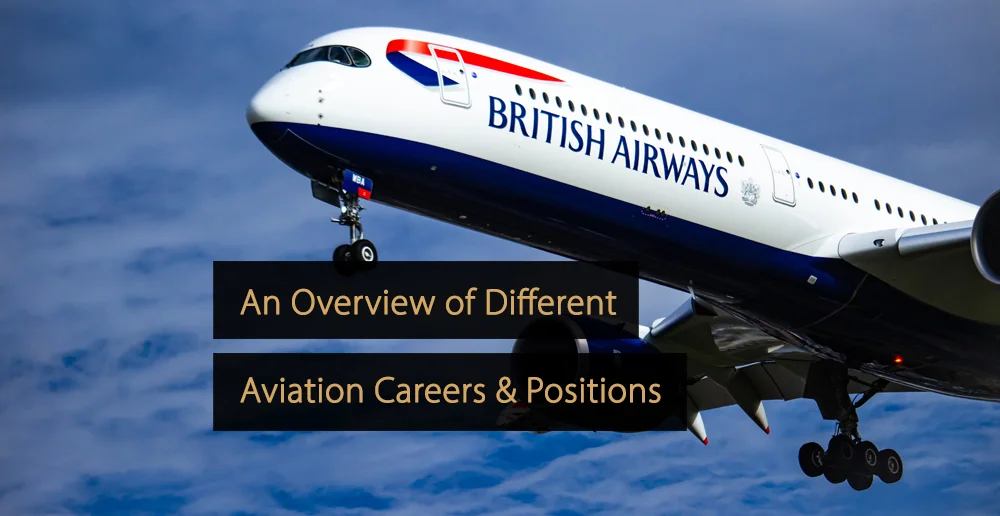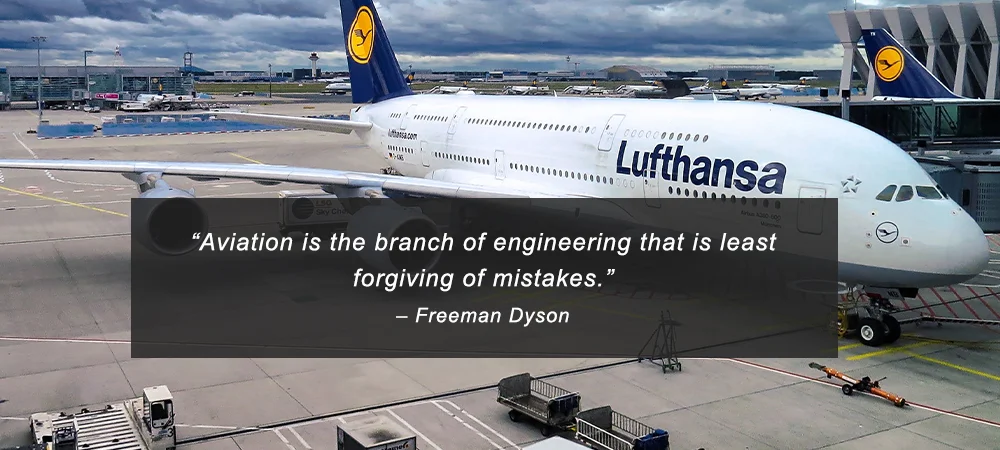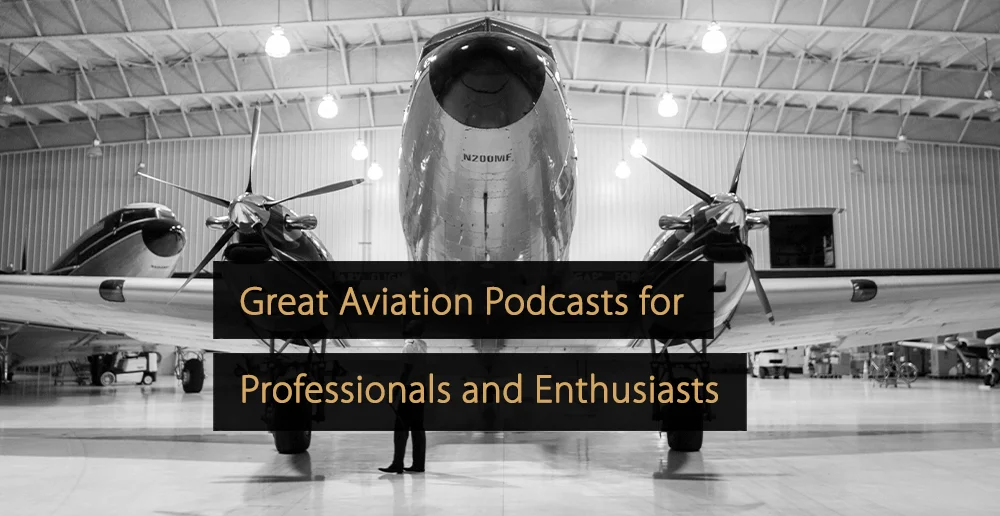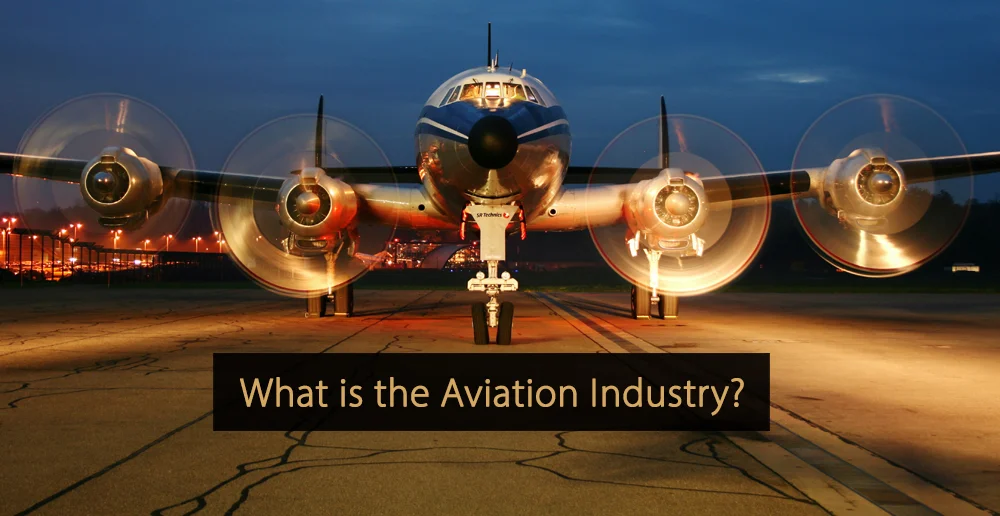Aviation is a field that offers many different career opportunities, and it is precisely this variety in possible aviation careers that means there are options for almost anyone. In this article, you will be able to learn much more about the different jobs in this area and the main skills required to succeed.
Table of Contents:
- What You Need to Know About the Aviation Industry
- An Overview of Different Aviation Careers
- Video Aviation Careers
- Education & Other Requirements for Aviation Careers
- Start Your Aviation Career With This List of Aviation Job Websites
- List of Recruitment Agencies Who Can Help You With Your Aviation Career
- List of Aircraft and Spacecraft Manufacturers to Begin Your Career
- Job Description and Tips for Finding Aviation Manager Positions
- A Guide to Start Your Aviation Management Career
- Aviation Courses: A List of Courses That Can Boost Aviation Careers
What You Need to Know About the Aviation Industry
Before exploring the various aviation career options, learning more about the aviation industry itself makes sense. In particular, it can be useful to know how the industry is defined, how it differs from the airline industry, who some of the main employers are, and what business models they tend to utilize.
Working in the aviation industry means being a big part of the global economy. According to The Number Of Flights Performed By The Global Airline Industry Report by Statista, there have been 34.4 million flights in 2023.
Read the article “Aviation Industry: All You Need to Know About the Aviation Sector”, where you will find all of this and much more, offering you an excellent base of knowledge to build upon with your aviation career.
An Overview of Different Aviation Careers
According to the Bureau of Transportation Statistics Report, in April 2023, industry-wide numbers of US aviation employees included 686,273 full-time and 110,573 part-time workers. The following are some of the main aviation careers you will have the option to enter into.
Flight / Cabin Attendant
A flight attendant’s job involves ensuring travelers are safe and comfortable. The responsibilities associated with the role include taking orders, serving food and drinks, answering questions, offering additional assistance, and providing passengers with safety information. In addition to being polite and patient, you will need to have excellent communication skills and a willingness to travel for work, often with a need to stay away from home.
Pilot / Co-Pilot
Pilots and co-pilots are the people responsible for actually flying aircraft. A significant amount of communication is involved, as you will need to liaise with air traffic controllers and other ground staff. Airline pilots tend to require a bachelor’s degree and a pilot’s license, but some pilot aviation careers do not require a degree. Concentration and the ability to make sound decisions under pressure are vital.
Air Traffic Control
Those in aviation careers linked to air traffic control monitor aircraft movements and provide directions or instructions to pilots and other crew members. In some circumstances, emergency instructions will need to be delivered. Therefore, to work in this role, you need to have excellent verbal communication skills and the ability to work under extreme pressure. You also need attention to detail and strong concentration.
Aeronautical Engineer
As an aeronautical engineer, you would be required to contribute to designing and developing aircraft and aircraft parts. This means researching, developing design concepts, testing prototypes, analyzing performance, developing the final product, and providing ongoing maintenance. A degree in a relevant field, such as aerospace engineering, aeronautical engineering, mechanical engineering, or software engineering, is needed.
Aircraft Mechanic
The key duties associated with the role of aircraft mechanic are performing repairs and carrying out preventative actions to ensure aircraft are in full working order. It is, therefore, one of the most important aviation careers, helping to keep aircraft fully functional and safe. You will need relevant formal qualifications and to complete a training program, which will likely include written and practical exams.
Airport Planner
Airport planners are responsible for planning an airport’s layout, including adding new buildings, new runways, and renovations. The role is a highly technical aviation career choice, requiring much research to understand the repercussions of any changes made. Furthermore, all decisions need to be justified and made in accordance with regulations. You will require a degree in a field like aviation management or engineering.
Airport Security Manager
If you gain employment as an airport security manager, you will be responsible for overseeing overall security at your airport. This will mean devising security strategies, monitoring security and safety procedures, and coordinating with other employees in this area. Degrees in aviation management, business management, or law enforcement are advantageous, but you will also need significant airport security experience.
Airfield Operations Specialist
Working as an airfield operations specialist is one of the more hectic aviation career options. In this role, you will effectively take control of the airfield at the airport where you work, helping to keep the area safe and operational. This can mean helping to manage takeoffs and landings and coordinating air traffic controllers, mechanics, security staff, and emergency response teams. Some jobs may require you to have a degree in aviation, airport management, or similar.
Administrative Jobs
There is a wide range of administrative aviation careers, with typical employers including airlines and aircraft manufacturers. Jobs exist for data entry clerks, human resources staff, public relations staff, receptionists, and communications staff. Many of these are excellent entry-level roles, with little formal education or previous work experience required, and there are often good long-term career prospects.
Airline Operations Agent
The role of an airline operations agent is varied but largely based on keeping track of passenger numbers, cargo movements, and fuel levels and managing schedules to keep things on track. If flights are overbooked, it will often be the responsibility of an airline operations agent to deal with it. Strong communication skills are important; a significant customer service element is usually associated with the job.
Airport Operations Manager
An airport operations manager is a senior position directly above the role of an airport operations agent. If you work in this particular job, you will manage the operations team, helping to plan schedules, monitor performance and implement any necessary changes. You may also take the lead in introducing new technology or working methods. Typically, airport operations managers will need to have experience as operations agents, although this is not always the case.
Airport Manager
An airport manager is responsible for making sure an airport functions properly. The role includes classic managerial duties, such as coordinating different teams, delegating work, hiring and firing employees, writing reports, and devising business strategies. On top of this, the job will also involve supervising other staff, ensuring the airport in question complies with all rules and regulations, and taking responsibility for training.
Airline Manager
For many people entering into aviation careers, the ultimate goal is to become an airline manager. If you succeed in finding employment in this role, you will be responsible for overseeing the main day-to-day operations of an airline. This may involve working in an office, stepping into different roles to help individual departments, and dealing with customers. Extensive experience with airlines or the aviation industry as a whole is needed.
Airport Director
The role of the airport director overlaps with the positions of airport manager and airport operations manager. However, directors often have a longer-term focus, helping implement new strategies and tie up contracts with airlines, retailers, security companies, and others involved in day-to-day airport operations. Significant airport experience is a must, and a degree in a relevant field, like aviation and business management, may be needed.
Meteorologist
Finally, an aviation meteorologist is one of the more fascinating and unique aviation careers. If you work in this role, you are responsible for monitoring weather patterns, forecasting weather conditions, and communicating up-to-date information to those who need it, including pilots, air traffic controllers, and airfield operations specialists. Aside from relevant qualifications, strong communication skills and attention to detail are essential.
Video Aviation Careers
Within this video, different careers are presented within the aviation industry.
Education & Other Requirements for Aviation Careers
Start Your Aviation Career With This List of Aviation Job Websites
Beginning your aviation career requires using the right channels, and the internet provides a range of excellent options. The websites you could potentially use to find work include corporate websites, industry job boards, recruitment agency websites, and social media platforms, and each of these options has its own unique benefits.
Read “Aviation Jobs: Overview of Sites to Find Aviation Vacancies” for a breakdown of these various methods, complete with more specific examples of websites and platforms to use during your job search.
List of Recruitment Agencies Who Can Help You With Your Aviation Career
Recruitment agencies can play a vital role in getting started in aviation careers. These agencies often work with industry employers for the long haul, helping them source talent and understand exactly what they are looking for in new recruits. These connections and insights can be invaluable for job seekers.
Read the “Aviation Management Jobs: List of Recruitment Agencies To Find a Job!” article to learn more about the benefits of recruitment agencies and to obtain a list of some of the best agencies to contact.
List of Aircraft and Spacecraft Manufacturers to Begin Your Career
The aerospace industry is made up of a wide range of different industry employers, offering numerous aviation career opportunities. Some of the biggest employers in the industry are aircraft and spacecraft manufacturers, with examples ranging from Boeing and Airbus to SpaceX and Virgin Galactic.
Check out “Aerospace Companies: List of Aircraft and Spacecraft Manufactures” for more details on the aerospace industry and the main employers operating in this field.
Job Description and Tips for Finding Aviation Manager Positions
Aviation managers take on a lot of responsibility, and the job tends to go to people who have worked in the industry for years or people who have significant managerial experience elsewhere. However, to transition into this role, you will need to understand precisely what it entails and how to find a vacancy.
Read our article, “Aviation Manager Job Description & Tips to Find the Job!” for more information.
A Guide to Start Your Aviation Management Career
Management-based aviation careers can be immensely rewarding for those willing and able to take on the extra responsibility. However, beginning your career is not always straightforward, as you need to make sure you have the right qualifications, understand the main duties, and know where to look for job opportunities.
To help you get started, the “Aviation Management: A Great Guide to Start Your Career in Aviation” article provides a comprehensive overview of the role, its requirements, the benefits and the best ways to find work.
Aviation Courses: A List of Courses That Can Boost Aviation Careers
The aviation industry is extremely diverse, with plenty of different careers available. In many cases, these career paths can be easier to navigate if you have relevant qualifications. With this in mind, it can be a good idea to explore the various aviation courses offered by educators.
If you want to learn more about the courses on offer, how they can benefit you, what they teach, and where you can find them, check out the “Aviation Course: A Comprehensive List of Courses & Aviation Educators” article.
Aviation Careers FAQs
The aviation industry can offer a wide range of job roles, accommodating people with different education standards, skill sets, and experience levels. The aviation careers outlined in this article account for the main positions likely to be available for you to apply for.
Did You Like This Article About Aviation Careers?
You might also be interested in the following articles:
- Airline Revenue Management: What is It, How Does it Work & Examples
- Space Tourist: Who Was the First Tourist in Space?
- Space Tourism: Space Companies That Will Make You An Astronaut
- Travel Industry: An Overview of One of the Largest Service Industries
- What is Travel Management?
More Tips to Grow Your Business
Revfine.com is the leading knowledge platform for the hospitality and travel industry. Professionals use our insights, strategies, and actionable tips to get inspired, optimize revenue, innovate processes, and improve customer experience.Explore expert advice on management, marketing, revenue management, operations, software, and technology in our dedicated Hotel, Hospitality, and Travel & Tourism categories.
This article is written by:
Hi, I am Martijn Barten, founder of Revfine.com. With 20 years of experience in the hospitality industry, I specialize in optimizing revenue by combining revenue management with marketing strategies. I have successfully developed, implemented, and managed revenue management and marketing strategies for individual properties and multi-property portfolios.










Thank you for this clear article. Very helpful for everyone searching for a job in aviation management.